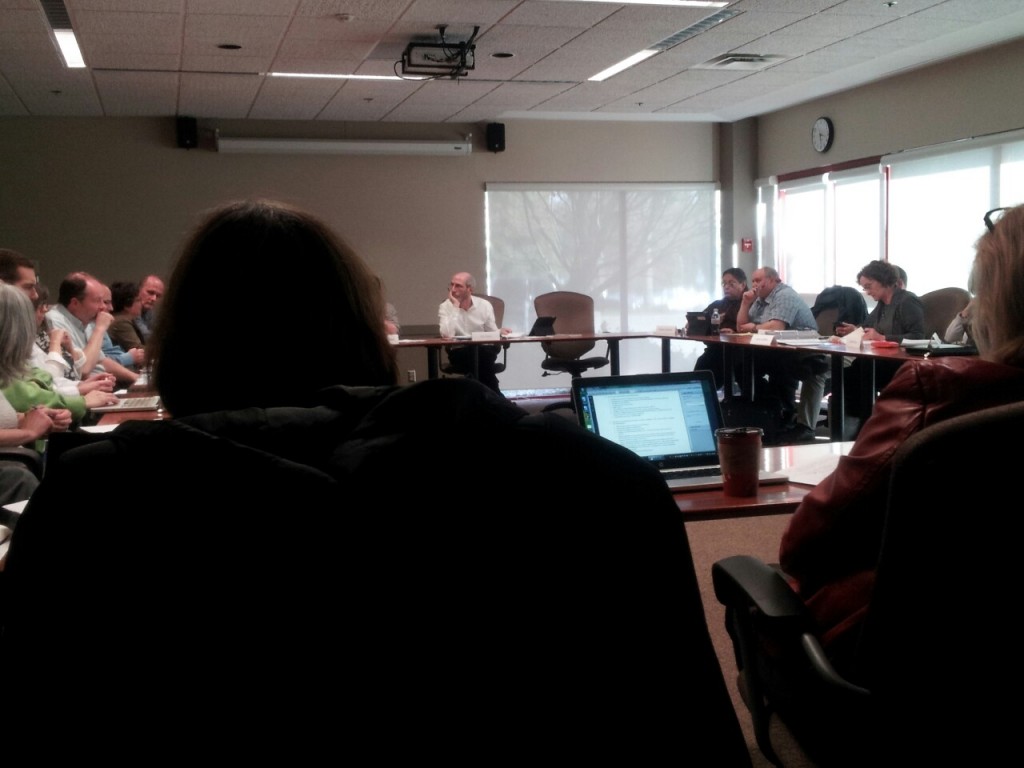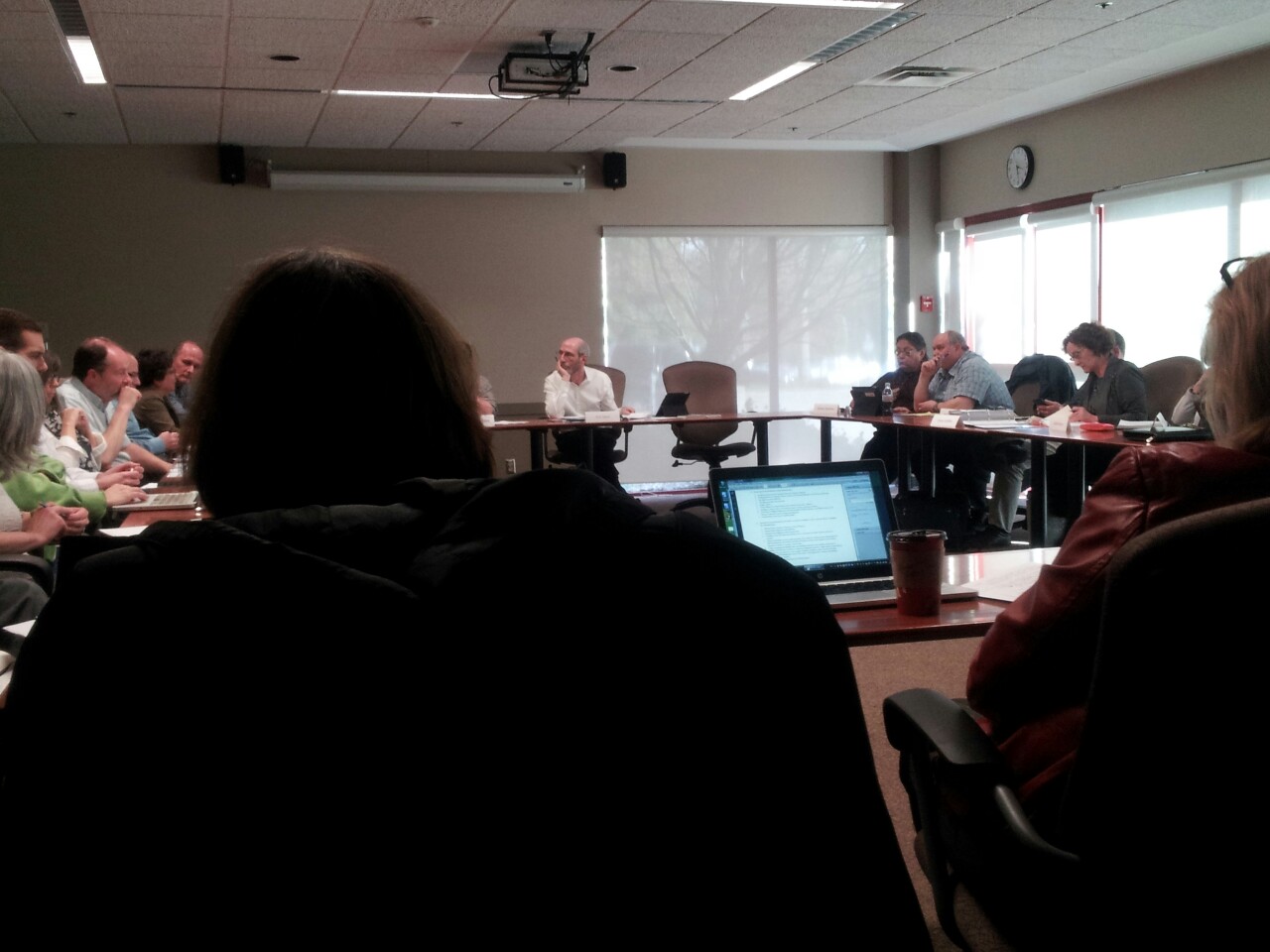
By Michael Scoular (The Cascade / Photo) – Email
Published online April 23, 2015
Before the members of the Academic Planning and Priorities Committee recommend anything about the Writing Centre’s closure and the Academic Success Centre’s origins, they first need to do some research. With 30 members, 20 of them holding votes, and a deadline just over a month away, that means the committee of faculty, administrators, staff, and students has a significant amount of project management ahead.
Sub-committees, public forums, document requests, and the everpresent dilemma of how to talk to students, or if going down that avenue should even be attempted, all emerged as ideas during the APPC’s April 15 meeting. In the end, the committee agreed on two things. In one week, a special meeting of the committee will occur, where members will hear presentations from people outside the committee that would like to have input on the Writing Centre decision. Written submissions and RSVPs for oral presentations will be accepted up to April 27, 48 hours before the meeting, with students receiving first priority in the presentation order. By that date, document requests to UFV administration will be fulfilled, promised VP academic Eric Davis, who is also chair of the APPC. From all this information, a sub-committee will order and synthesize a reading package for members of the APPC, which will also be passed on to Senate, with the full documents available to those that wish to review the whole backstory.
Those two unknowns, which APPC is planning around, became the subject of most of the committee’s debate. Davis supplied a list of possible documents that the APPC would view, however these were divided into ones senior administration would provide, and ones the committee would potentially have to produce. The administration list mostly correlated to the formation and planning of the Academic Success Centre, while the committee’s list suggested additional research about the Writing Centre. Members did not support this plan, while agreeing that the overall list of documentation was of equal importance.
“The way this is framed, it feels kind of odd to me, that APPC is having to produce the documents for part of this conversation,” said Christine Slavik, the committee’s vice-chair. “There’s a tension here for me around this committee having to do the work of part of the conversation normally we’d have brought to us. There must have been some rationale, some comparison around the Writing Centre in its previous form.”
Gerry Palmer, an APPC member because of his role as Senate vice-chair, was against the delegation of work for a different reason. “It presumes that APPC is against the new proposal and that APPC has to come up with the justification of opposing it,” he said.
Discussion swayed between generating ideas for how to obtain more information, and reminders that due to time constraints and practicality, this information might need a narrower focus. Particularly, because of the APPC’s task as the first body external to administration to look into the Writing Centre decision, there is the idea that this gathering and sharing of documentation should be thorough. However, the end decision, which lies with the Board of Governors, will be based on the Board’s motion, which applies the Writing Centre to Academic Success Centre change only to the UFV Education Plan and Strategic Enrolment Plan.
With that first impulse, members suggested additional pedagogical ways of looking at the decision, and the idea for presentations from the public was brought up. This immediately turned into the question of how to accomodate the potentially large number of people interested in presenting ideas and arguments to the APPC within two hours, and then how to decide the order of speakers.
“We have a task, but it’s a discreet task, and let’s not make it too onerous,” Davis said. “We’re asked to provide advice and this committee should get whatever data and information it needs to help come up with its advice, but let’s not be too ambitious.”
The committee agreed to give students first order on a speakers list after Associate VP for Employee Services Diane Griffiths reminded the APPC of how written submissions that link policy with practical outcomes come more naturally to committee members than the average student affected by this change.
“What I think I’m hearing is we need voices who could not otherwise be heard, and to my mind that’s always the student voice,” she said. “And I don’t know that all of our students really understand the context of some of these questions that are being asked, but they would have a viewpoint … I think if I we’re going to have to make choices between whom I would listen to and who I wouldn’t, I would go with the student voices.”
In the emails and UFV website posts calling for speakers, there is still the explicit requirement that all speakers still make their statements apply to the Education Plan, Strategic Enrolment Plan, or the structure of the past and future Centres.
As the APPC and Senate consultation process stretches into the summer, this will also affect the people attending meetings, reading documents, and voting on decisions. Davis announced he will be on leave beginning at the end of April, and at least five other APPC members said they will not be able to attend the public presentation meeting on April 29.


